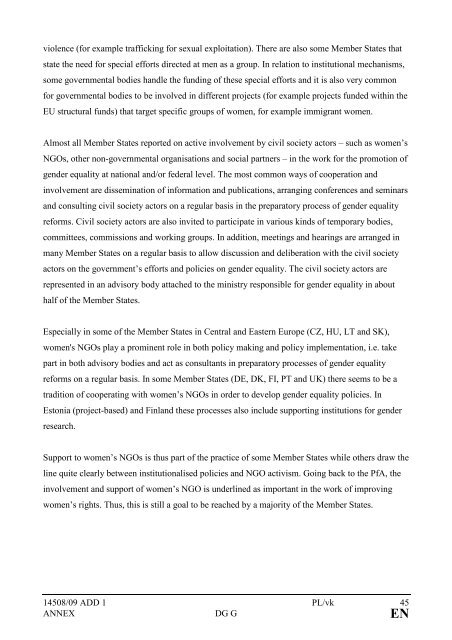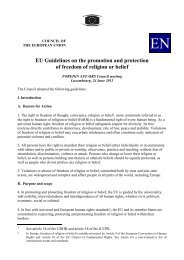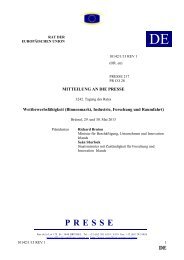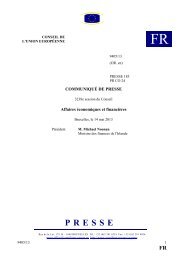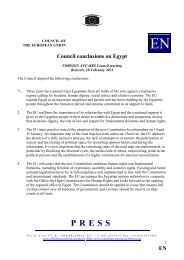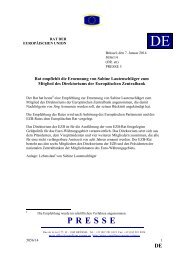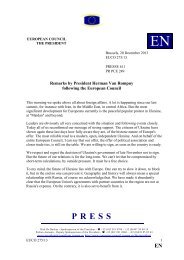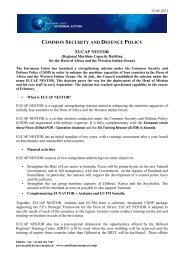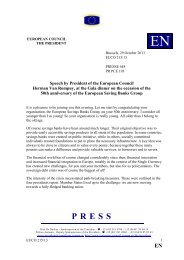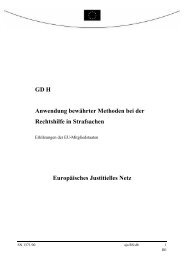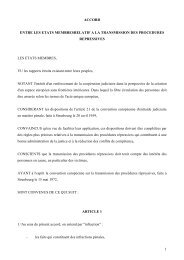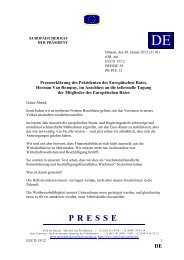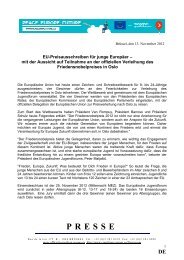14508/09 ADD 1 PL/vk 1 DG G COUNCIL OF THE ... - Europa
14508/09 ADD 1 PL/vk 1 DG G COUNCIL OF THE ... - Europa
14508/09 ADD 1 PL/vk 1 DG G COUNCIL OF THE ... - Europa
You also want an ePaper? Increase the reach of your titles
YUMPU automatically turns print PDFs into web optimized ePapers that Google loves.
violence (for example trafficking for sexual exploitation). There are also some Member States that<br />
state the need for special efforts directed at men as a group. In relation to institutional mechanisms,<br />
some governmental bodies handle the funding of these special efforts and it is also very common<br />
for governmental bodies to be involved in different projects (for example projects funded within the<br />
EU structural funds) that target specific groups of women, for example immigrant women.<br />
Almost all Member States reported on active involvement by civil society actors – such as women’s<br />
NGOs, other non-governmental organisations and social partners – in the work for the promotion of<br />
gender equality at national and/or federal level. The most common ways of cooperation and<br />
involvement are dissemination of information and publications, arranging conferences and seminars<br />
and consulting civil society actors on a regular basis in the preparatory process of gender equality<br />
reforms. Civil society actors are also invited to participate in various kinds of temporary bodies,<br />
committees, commissions and working groups. In addition, meetings and hearings are arranged in<br />
many Member States on a regular basis to allow discussion and deliberation with the civil society<br />
actors on the government’s efforts and policies on gender equality. The civil society actors are<br />
represented in an advisory body attached to the ministry responsible for gender equality in about<br />
half of the Member States.<br />
Especially in some of the Member States in Central and Eastern Europe (CZ, HU, LT and SK),<br />
women's NGOs play a prominent role in both policy making and policy implementation, i.e. take<br />
part in both advisory bodies and act as consultants in preparatory processes of gender equality<br />
reforms on a regular basis. In some Member States (DE, DK, FI, PT and UK) there seems to be a<br />
tradition of cooperating with women’s NGOs in order to develop gender equality policies. In<br />
Estonia (project-based) and Finland these processes also include supporting institutions for gender<br />
research.<br />
Support to women’s NGOs is thus part of the practice of some Member States while others draw the<br />
line quite clearly between institutionalised policies and NGO activism. Going back to the PfA, the<br />
involvement and support of women’s NGO is underlined as important in the work of improving<br />
women’s rights. Thus, this is still a goal to be reached by a majority of the Member States.<br />
<strong>14508</strong>/<strong>09</strong> <strong>ADD</strong> 1 <strong>PL</strong>/<strong>vk</strong> 45<br />
ANNEX <strong>DG</strong> G EN


